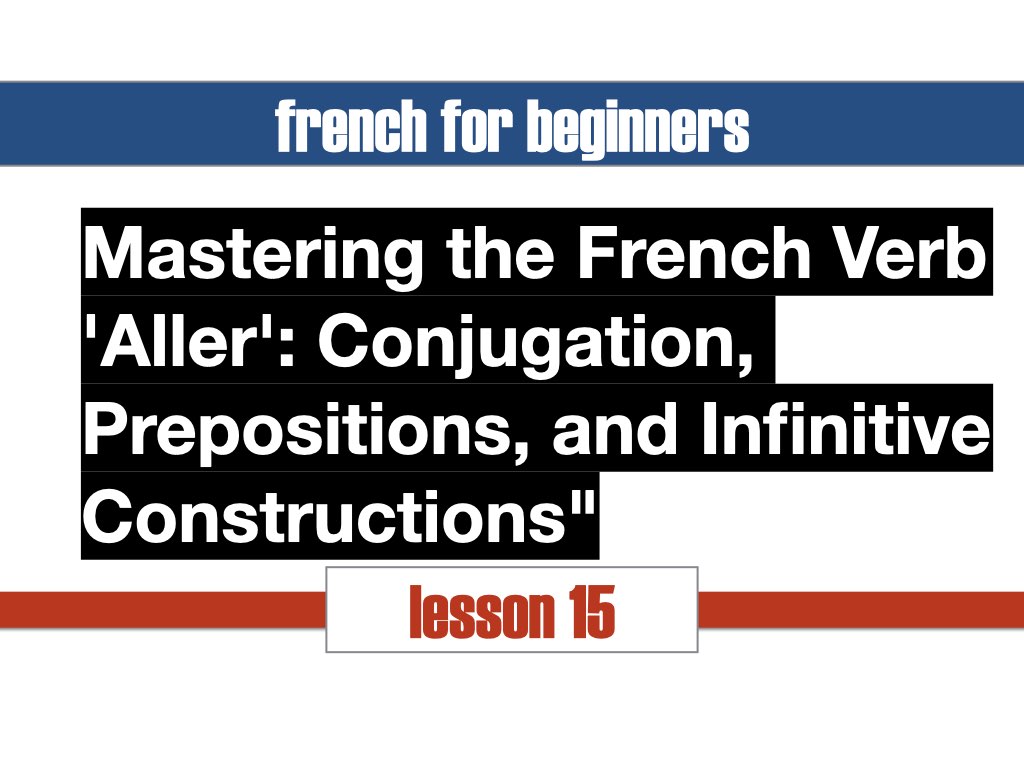Mastering the French Verb Aller : Conjugation, Prepositions, and Infinitive Constructions”
In this lesson, we will study the conjugation of the verb ‘aller’. We will look at some examples of using ‘aller + preposition’. Then, we will see how to use the verb ‘aller’ followed by a verb in the infinitive.
| Affirmative Form | Negative Form | Interrogative Form |
|---|---|---|
| je vais | je ne vais pas | vais-je ? |
| tu vas | tu ne vas pas | vas-tu ? |
| il/elle va | il/elle ne va pas | va-t-il/elle ? |
| nous allons | nous n’allons pas | allons-nous ? |
| vous allez | vous n’allez pas | allez-vous ? |
| ils/elles vont | ils/elles ne vont pas | vont-ils/elles ? |
🔷 Aller + Preposition
Verb aller + à + place
a. “aller à” followed by a city
We always use “à” before a city.
Examples:
- Je vais à Paris. I go to Paris.
- Vous n’allez pas à Londres. You are not going to London.
- Allez-vous à Toulouse? Are you going to Toulouse?
⚠️ Note for cities preceded by an article:
Examples:
- Elles vont au Caire. They go to Cairo.
- Allez-vous à La Rochelle? Are you going to La Rochelle?
- Tu ne vas pas au Havre. You are not going to Le Havre.
b. “aller à” followed by a country
The preposition changes according to the gender and number of the country.
- Je vais en France et au Japon. I go to France and Japan.
- Vont-ils au Maroc cet été? Are they going to Morocco this summer?
- Non, ils ne vont pas au Maroc. Ils vont aux Pays-Bas. No, they are not going to Morocco. They are going to the Netherlands.
c. “aller à” followed by other places
In other cases, follow the rule of the contracted article.
Examples:
- Vas-tu à la boulangerie. Are you going to the bakery?
- Nous n’allons pas au supermarché. We are not going to the supermarket.
- Je vais aux toilettes. I am going to the bathroom.
🔷 Aller + Infinitive
When the verb aller is followed by an infinitive, the sentence implies the near future ( Going-to future )
Examples:
- Ils vont partir demain. They are going to leave tomorrow.
- Elles vont aller à la boulangerie. They are going to the bakery.
- Je vais me dépêcher. I am going to hurry up.
🔷 Aller Bien
“aller bien” means “to be in good health.” It is used especially in greetings.
Examples:
- Comment allez-vous? How are you?
- Vous allez bien ? — Oui, très bien merci. Are you doing well? Yes, very well thank you.
- Salut, ça va ? — Ça va ! Et toi ? Hi, how are you? — I’m good! And you?
🍀 EXERCISES 🍀
A) Complete with the verb aller.
- Bonjour, tu ____ bien ?
- Je ____ bien. Et toi ?
- Ça ____. Vous ____ où comme ça ?
- Nous ______ au parc Astérix. Mes amis y ______ aussi.
B) Write the sentences Going-to future .
- Mes parents partent pour Strasbourg ce matin.
- Comment est-ce que tu vas à Lille ?
- Je vois cette exposition demain.
- C’est formidable !


